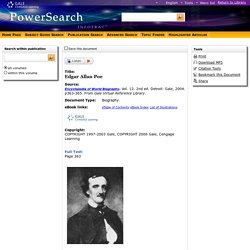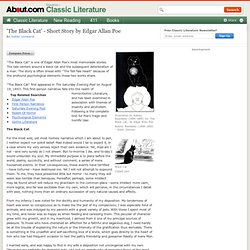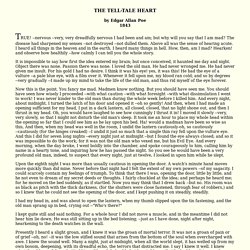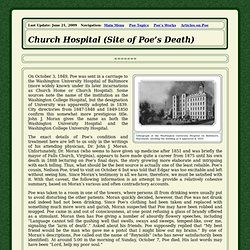

Gale Power Search - Document. Edgar Allan Poe was best known to his own generation as an editor and critic; his poems and short stories commanded only a small audience.

But to some extent in his poems, and to an impressive degree in his tales, he pioneered in opening up areas of human experience for artistic treatment at which his contemporaries only hinted. His vision asserts that reality for the human being is essentially subterranean, contradictory to surface reality, and profoundly irrational in character. Two generations later he was hailed by the symbolist movement as the prophet of the modern sensibility. Poe was born in Boston on Jan. 19, 1809, the son of professional actors. By the time he was 3, Edgar, his older brother, and younger sister had lost their mother to consumption and their father through desertion.
Full Text: Page 364 | Top of Article A New Family As Edgar entered adolescence, however, bad feelings developed between him and John Allan. Edgar Allan Poe. Top 10 Creepiest Tales of Edgar Allan Poe. Creepy Edgar Allan Poe.

Can you think of a name more synonymous with spine-tingling macabre literature? A master craftsman of prose and poetry alike, Poe dwells in that dark corner of our literary consciousness, along some creaky corridor laden with dust and cobwebs. Even more than a century on, reading Poe still feels like walking a razor’s edge between grim amusement and irrevocable madness. Here is a list of ten of Poe’s best-known tales and poems. Hop-Frog published 1849 A dwarfish court jester serves as the titular character of this fiendish revenge tale. Read Edgar Allan Poe books online. 'The Black Cat' - Short Story by Edgar Allan Poe. "The Black Cat" is one of Edgar Allan Poe's most memorable stories.

The tale centers around a black cat and the subsequent deterioration of a man. The story is often linked with "The Tell-Tale Heart" because of the profound psychological elements these two works share. "The Black Cat" first appeared in The Saturday Evening Post on August 19, 1843. This first-person narrative falls into the realm of Horror/Gothic Literature, and has been examined in association with themes of insanity and alcoholism. Following is the complete text for Poe's tragic and horrific tale: The Black Cat For the most wild, yet most homely narrative which I am about to pen, I neither expect nor solicit belief. From my infancy I was noted for the docility and humanity of my disposition.
I married early, and was happy to find in my wife a disposition not uncongenial with my own. Pluto--this was the cat's name--was my favorite pet and playmate. The Tell-Tale Heart by Edgar Allan Poe. By Edgar Allan Poe 1843 TRUE!

--nervous --very, very dreadfully nervous I had been and am; but why will you say that I am mad? The disease had sharpened my senses --not destroyed --not dulled them. Above all was the sense of hearing acute. I heard all things in the heaven and in the earth. It is impossible to say how first the idea entered my brain; but once conceived, it haunted me day and night. Now this is the point. Upon the eighth night I was more than usually cautious in opening the door. Edgar Allan Poe Biography. “The death of a beautiful woman is unquestionably the most poetical topic in the world.”

“Lord, help my poor soul.” “Sound loves to revel near a summer night.” “But as, in ethics, evil is a consequence of good, so, in fact, out of joy is sorrow born. Either the memory of past bliss is the anguish of to-day, or the agonies which are have their origin in the ecstasies which might have been.” “They who dream by day are cognizant of many things which escape those who dream only by night.” “The boundaries which divide life from death are at best shadowy and vague. “With me poetry has been not a purpose, but a passion; and the passions should be held in reverence; they must not — they cannot at will be excited, with an eye to the paltry compensations, or the more paltry commendations, of mankind.” “And now — have I not told you that what you mistake for madness is but over-acuteness of the senses? “All that we see or seem is but a dream within a dream.”
“I have no faith in human perfectibility. Academy of American Poets. Read poems by this poet On January 19, 1809, Edgar Allan Poe was born in Boston, Massachusetts. Poe’s father and mother, both professional actors, died before the poet was three years old, and John and Frances Allan raised him as a foster child in Richmond, Virginia. John Allan, a prosperous tobacco exporter, sent Poe to the best boarding schools and later to the University of Virginia, where Poe excelled academically. After less than one year of school, however, he was forced to leave the university when Allan refused to pay Poe’s gambling debts. Poe returned briefly to Richmond, but his relationship with Allan deteriorated. Poe the Person: Interactive Timeline. Detailed Information About Poe.
Site of Poe's Death. On October 3, 1849, Poe was sent in a carriage to the Washington University Hospital of Baltimore (more widely known under its later incarnations as Church Home or Church Hospital).

Some sources note the name of the institution as the Washington College Hospital, but the designation of University was apparently adopted in 1839. City directories from 1847-1848 and 1849-1850 confirm this somewhat more prestigious title. John J.